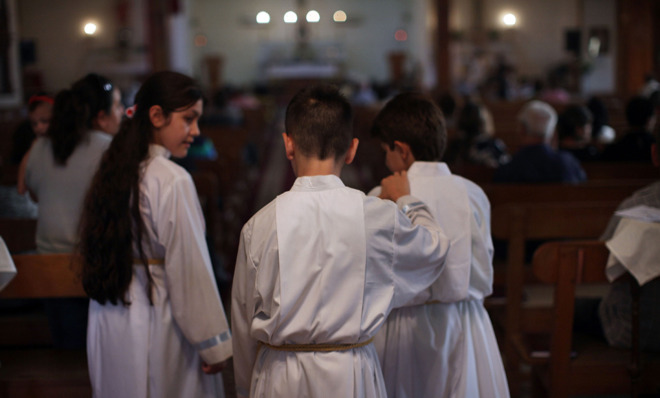Why America is duty bound to help Iraqi Christians
Our war led to the destruction of their communities. We must offer them aid and assistance now.


A free daily email with the biggest news stories of the day – and the best features from TheWeek.com
You are now subscribed
Your newsletter sign-up was successful
Just 11 years ago, there were 1.5 million Christians living in Iraq. Since the U.S. war there, that number has plummeted to approximately 400,000 — and it is still falling fast. The chaos created by the U.S. invasion, occupation, and withdrawal, as well as the ongoing Syrian civil war and insurgent-fueled unrest in much of Iraq, has dramatically increased the persecution and pressure on Iraq's Christians and other religious minorities.
ISIS, the emergent Islamist terrorist group that spans from Syria into Iraq, has already taken over Mosul, Iraq's second-largest city. They painted signs on the walls of Christian homes, meant to indicate to all the presence of a minority they hate. They gave Christians a choice and a deadline: Pay an exorbitant tax, convert to Islam, leave, or be put to death. Most have fled after having their property confiscated. Five Christian families, according to The New York Times, had members too ill to flee to Kurdistan or Turkey, and so consented to a forced conversion to Islam. ISIS burned Christian churches, and dug up a shrine many Middle Eastern Christians believe is the final resting place of the prophet Jonah, along with another site said to contain the Biblical prophet Seth.
Reading these headlines and tut-tutting isn't enough. The U.S. owes Christians and other persecuted Iraqi minorities assistance.
The Week
Escape your echo chamber. Get the facts behind the news, plus analysis from multiple perspectives.

Sign up for The Week's Free Newsletters
From our morning news briefing to a weekly Good News Newsletter, get the best of The Week delivered directly to your inbox.
From our morning news briefing to a weekly Good News Newsletter, get the best of The Week delivered directly to your inbox.
For years, America has proven itself both unwilling and unable to restore peace between warring ideological, ethnic, and religious factions in Iraq through military force. And nobody should think that a renewed American military presence is a practical way to pacify the region, which seems to be transforming according to an internal logic the U.S. cannot significantly alter.
But the U.S. has sent arms to Iraq to aid its fight against extremist groups. And the U.S. still sends over $1 billion in foreign aid. As such, America could premise some of this aid, or even an increase, on the government doing a better or more vigorous job of protecting religious minorities in Iraq. Of course, this may not be the most important or effective means of assisting persecuted Christians. And in fact, Iraq has rejected some extra forms of foreign assistance, fearing it makes the new regime look like a puppet.
So the U.S. should look for ways to provide direct monetary and diplomatic assistance to neighboring states in the region where persecuted Iraqis are seeking refuge, perhaps even going so far as to directly assist in the emerging centers of authority in Kurdistan, where some refugees have sought protection from ISIS, and which continues to prove itself capable of maintaining some order and security.
Although I'm generally inclined toward a more restrictive position on immigration, the U.S. should, as a matter of practice, be especially generous in granting refugee status to the collateral victims of the war we started in Iraq. It should even offer some refugees of ISIS persecution the material resources to emigrate to America if they so desire.
A free daily email with the biggest news stories of the day – and the best features from TheWeek.com
The dream of transforming Iraq into an incubator of Arab liberalism has turned into a nightmare for religious minorities. America's intervention in Iraq, and its support of Syrian and Libyan rebels, have created a disastrous disorder in which Islamist threats thrive.
Mosul was a home for Christians for as long as Christianity existed. Not anymore. Now, the U.S. cannot restore these people to their homes, or reverse the desecration of Christian shrines. But our diplomatic, financial, and moral energies should be used to protect them from any further harm.
Michael Brendan Dougherty is senior correspondent at TheWeek.com. He is the founder and editor of The Slurve, a newsletter about baseball. His work has appeared in The New York Times Magazine, ESPN Magazine, Slate and The American Conservative.
-
 The EU’s war on fast fashion
The EU’s war on fast fashionIn the Spotlight Bloc launches investigation into Shein over sale of weapons and ‘childlike’ sex dolls, alongside efforts to tax e-commerce giants and combat textile waste
-
 How to Get to Heaven from Belfast: a ‘highly entertaining ride’
How to Get to Heaven from Belfast: a ‘highly entertaining ride’The Week Recommends Mystery-comedy from the creator of Derry Girls should be ‘your new binge-watch’
-
 The 8 best TV shows of the 1960s
The 8 best TV shows of the 1960sThe standout shows of this decade take viewers from outer space to the Wild West
